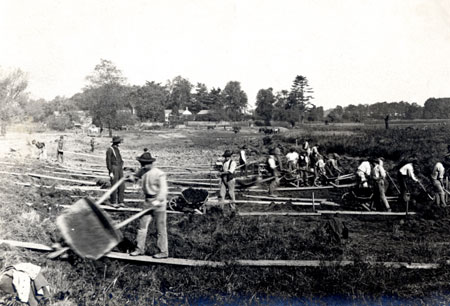
Lake Carnegie was constructed in 1906 as the result of a conversation between Howard Russell Butler, Class of 1876, and industrialist Andrew Carnegie. Butler, a member of the crew team, described the difficulty of rowing on the narrow and heavily trafficked Delaware and Raritan Canal. The idea of using the Stony Brook and Millstone River to create a lake between Princeton and Kingston appealed to Carnegie, who funded the enterprise as a gift to the University. The project involved clearing trees, excavating up to two feet of earth, and then building a 650-foot dam as well as four bridges.
Now a much-loved feature of the landscape, Lake Carnegie is used for regular practice and for competitions by four Princeton crew teams—men’s heavyweight, women’s open, and men’s and women’s lightweight—all of whom will be competing this coming weekend at the annual Eastern Sprints Regatta.
Photo courtesy of Princeton University Archives.
I have heard that one of the reasons Andrew Carnegie funded the construction of Lake Carnegie was that he was unhappy with the rising popularity of tackle football, which he thought an unbecoming pastime for young college men, and was hoping that an improved scull racing course on campus(crew being a more appropriate sport for young men in his view) would deter P.U. students from joining the football squad and encourage rowing participation instead.
Is this scenario close to the truth? Or an old wives' tale? Anyone out there know the answer?
I have some friends who are well-versed in rowing history, and some colleagues who know everything about Princeton history and lore.
I will ask the question and will post again if I get an answer.
According to JT Miller '70:
"True story. Carnegie was an ardent promoter of world peace and felt
that football, far more brutal and violent in the early 20th century
than today even, was warlike and an inappropriate activity for
gentlemen. He made comments to this effect, and on his preference for
rowing, at the dedication of the lake. These were not particularly
well-received by the gridiron-crazed Tiger undergraduates."